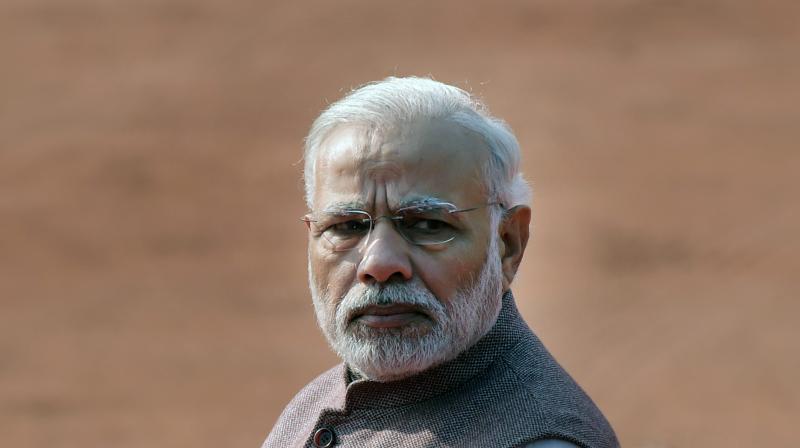Sahara diaries: SC rejects plea for SIT probe against Modi, others
Income Tax Settlement Commission has also found prima facie that material recovered from Sahara were fabricated, says SC.

New Delhi: The Supreme Court on Wednesday rejected plea for a court-monitored SIT probe into bribery allegations against Prime Minister Narendra Modi on the basis of documents seized during the raids in business houses - Sahara and Birla - on the ground they had no evidentiary value.
The case based on "random materials" like loose sheets, papers, e-mail print outs is "merit less" as they are "inadmissible materials" having "no evidentiary value under the law" to order registration of FIR and investigation, more so against the high constitutional functionaries, whose names are mentioned in the documents which has been held as prima facie "fabricated" by income tax settlement commission, the court said.
The high-voltage hearing was conducted by a new bench of Justices Arun Mishra and Amitava Roy which said "courts have to be on guard" while dealing with matters demanding probe against high functionaries as the case in hand was devoid of any "cogent" material or "independent evidence corroborating materials" to order investigation.
The new bench was constituted as Prashant Bhushan, lawyer for the Common Cause, had sought recusal of the then Chief Justice of India-designate, Justice J S Khehar, on the ground that his file for elevation for CJI was pending with the executive headed by the Prime Minister.
"There must be some cogent, reliable and admissible evidence". Otherwise the process of law can be abused to achieve ulterior goals," the court observed dismissing the NGO's plea.
Dissatisfied with the loose sheets, which were claimed to be part of the diary entries of the Sahara Group and Aditya Birla Group, containing entries like "Gujarat CM" and other politicians, the bench said materials placed on record by the NGO, Common Cause were not maintained by the two business housed in the regular course of business.
Another bench of the court had earlier termed the loose sheets and other material "zero material" to order investigation.
"In view of the materials placed on record and peculiarity of the facts and circumstances, no case is made out on merits to direct investigation against various political functionaries, officers etc. The interim applications are found to be merit less and are dismissed," the bench said.
The bench also referred to the order passed by the Income Tax Settlement Commission in the Sahara group matter and said that the commission has also found prima facie that materials recovered from the group were not genuine and fabricated.
The court said that independent evidence corroborating materials placed on record was "necessary as to trustworthiness of the documents to fasten liability" and it was apparent from the earlier judgements and laid down law that "loose sheets of papers are not admissible evidence".
"We are constrained to observe that courts have to be at guard while ordering investigation against any important constitutional functionaries. In the absence of some cogent material, the documents on the basis of which investigation is sought is itself inadmissible as evidence," the bench said in its order after a day-long hearing in the matter.
"Irrespective of the fact, we have apprehension even to initiate investigation in the case and if we do so, investigation can be ordered against a person whosoever high in integrity on the basis of entries made by some unscrupulous elements in accounts of book which should not be random and there must be some cogent, reliable and admissible evidence," it said.
The apex court said, "There has to be, in our opinion, some cogent and admissible evidence and some other circumstances to show that person against whom allegations are levelled is involved in the matter or has done some act in that period which may have correlation with random entries.
"In case, we don't insist on all this, the process of law can be abused to achieve ulterior goals and no one can survive in case investigation are readily ordered against constitutional functionaries without cogent materials on record," it said.
It further said, "We find that materials placed on record, either in the case of Birla or Sahara, either excel sheets, diaries, e-mails etc they are not maintained in the regular course of business".
Referring to the order of the IT Settlement in Sahara's case has recorded that transactions shown in the purported documents were "not genuine or not have any evidentiary value".
"It is apparent that purported documents of Sahara have not been relied upon by the IT Settlement Commission in the order dated November 11, 2016. With regard to the payments, the documents have not been relied upon.”
"Though, the findings are not binding, when we examine the findings coupled with the orders passed by this court, we are of the opinion that no case is made out on the merits of these documents and materials which are placed on record to direct investigation against anyone named in the documents in Sahara's case," the bench said.
The top court said that the apex court's decision relied upon by the petitioner for seeking investigation was of "no help" to them as the "materials are not good enough to direct registration of FIR".
"The shape in which these documents have been collected and filed and statements made by the officials of Birla Group...it is not safe and proper to direct investigation in this case," it said.
The bench agreed with the submissions of Attorney General Mukul Rohatgi who referred to earlier judgements of the apex court and said that entries made by unscrupulous persons in papers, diaries were inadmissible evidence.
Activist-lawyer Prashant Bhushan termed the judgement as unfortunate. In a statement, Bhushan who appeared for the NGO Common Cause in the case, said the judgement will leave a cloud of suspicion over all the persons mentioned in some documents.
The cloud could have dissipated had there been an independent investigation into the documents, he said.

